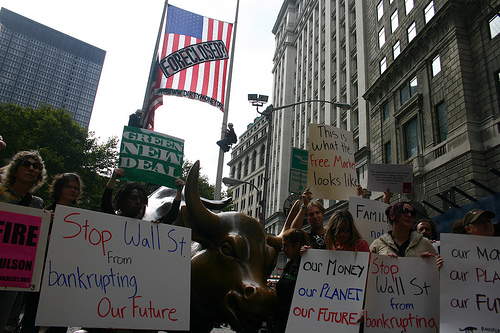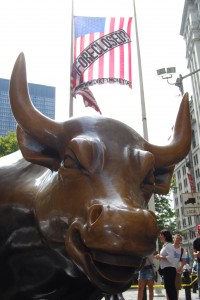UPDATE 2: link to Flickr set
—
In the past few weeks, our economic system has sustained some of the most dramatic shifts of the past 50 years. Comparisons have been made to the Asian economic crisis of the nineties, the dot-com bust of the early 21st century, and even the Great Depression. Our economic and financial system is in tatters, and all of us are wondering what will come of our savings, our homes, and our future.
The news has been focused on whether and what kind of a bailout package will be handed to the very financial institutions that got us into this mess. Understandably so: $700 billion is a large sum of money, and a significant contribution from taxpayers wallets, especially when compared to other possible uses of such a cash injection—Medicare, infrastructure or renewable energy, to name just a few.
However, with the unprecedented nationalization of Freddie and Fannie, Lehman Brothers filing the largest bankruptcy filing in U.S. history, and Goldman Sachs and Morgan Stanley voluntarily becoming bank holdings companies, the actions taken by the Federal Reserve are themselves an admission that the institutions that makeup the U.S. financial system are broken.
It is critical that we look beyond the bailout to the underlying cracks this crisis has exposed in our financial system. We cannot allow the bailout (whatever its conditions) to further subsidize the decades of risky financial behavior that is now mortgaging our homes and our planet.
We have an unprecedented opportunity to rebuild our economy and establish a financial system that operates within ecological limits. It’s time for Americans to demand structural solutions that put families before financiers and the planet before profits.
For the past eight years, RAN’s Global Finance Campaign has urged America’s leading financial institutions to take responsibility for the impacts of their investments and to recognize the financial and reputational risks inherent in directing vast sums of capital towards environmentally unsustainable and socially unjust projects—from rainforest destruction and oil extraction to the construction of coal-fired power plants.
Banks need to be held accountable for the impacts of their investments, whether they are subprime mortgages or new coal plants. In both cases, the impact of the financing deal is ‘externalized’ – that is, the effect on people and the environment is not considered when the loan or transaction is being approved. In the case of subprime mortgages, home foreclosures were not considered a ‘downside’ until they started happening at a rate that impacted the viability of the financial system itself. The same reasoning holds true in the financing of fossil fuel projects. The impacts of constructing coal-fired power plants on the climate and on communities have not been deemed key factors in determining whether or not to finance such projects.
There has never been a better time to hold banks accountable for the impacts of their investments and demand that they develop the necessary due diligence processes to ensure that we do not mortgage the Earth’s natural capital in the same way that we have mortgaged the futures of millions of Americans whose homes have been foreclosed on.
It is crucial to take this opportunity to shift the debate from one that dwells on the immediate need to staunch the bleeding from the subprime meltdown to one that is based on a vision for a socially just and ecologically sustainable financial system.
All eyes are on Wall Street—Now is the time.

